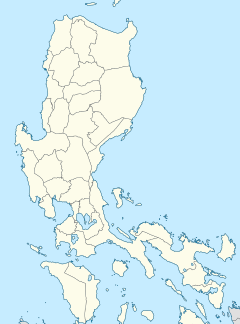Paco station is a railway station located on the South Main Line in the city of Manila, Philippines. It was originally opened by the Manila Railroad Company in 1908 as a major hub in the southern half of Manila, where trains toward Cavite province once operated. The old train station building was designed by William E. Parsons and was completed in 1915. Prior to the electrification plan in the late 1970s, Paco was the southernmost double-track station on the line.
| Train station | |||||||||||||||||
 Platform area of Paco station | |||||||||||||||||
| General information | |||||||||||||||||
| Location | Pedro Gil Street, Paco Manila, Metro Manila Philippines | ||||||||||||||||
| Coordinates | 14°34′45″N 120°59′57″E / 14.57917°N 120.99917°E | ||||||||||||||||
| Owned by | Philippine National Railways | ||||||||||||||||
| Operated by | Philippine National Railways | ||||||||||||||||
| Line(s) | South Main Line Planned: South Commuter Former: Naic and Cavite | ||||||||||||||||
| Platforms | 2 side platforms 2 island platforms (NSCR) | ||||||||||||||||
| Tracks | 2 6 (NSCR and SLH) | ||||||||||||||||
| Construction | |||||||||||||||||
| Accessible | Yes | ||||||||||||||||
| Architect | William E. Parsons[a] | ||||||||||||||||
| Architectural style | Beaux-Arts[a] | ||||||||||||||||
| Other information | |||||||||||||||||
| Station code | PC | ||||||||||||||||
| History | |||||||||||||||||
| Opened | March 25, 1908 | ||||||||||||||||
| Rebuilt | 2009 | ||||||||||||||||
| Services | |||||||||||||||||
| |||||||||||||||||
| |||||||||||||||||
| |||||||||||||||||
PNR Metro Commuter | ||||||||||||||||||||||||||||||||||||||||||||||||||||||||||||||||||||||||||||||||||||||||||||||||||||||||||||||||||||||||||||||||||||||||||||||||||||||||||||||||||||||||||||||||||||||||||||||||||||||||||||||||||||||||||||||||||||||||||||||||||||||||||||||||||||||||||||||||||||||||||||||||||||||||||||||||||||||||||||||||||||||||||||||||||||||||||||||||||||||||||||||||||||||||||||||||||||||||||||||||||||||||||||||||||||||||||||||||||||||||||||||||||||||||||||||||||||||||||||||||||||||||||||||||||||||||||||||||||||||||||||||||||||||||||||||||||||||||||||||||||||||||||||||||||||||||||||||
|---|---|---|---|---|---|---|---|---|---|---|---|---|---|---|---|---|---|---|---|---|---|---|---|---|---|---|---|---|---|---|---|---|---|---|---|---|---|---|---|---|---|---|---|---|---|---|---|---|---|---|---|---|---|---|---|---|---|---|---|---|---|---|---|---|---|---|---|---|---|---|---|---|---|---|---|---|---|---|---|---|---|---|---|---|---|---|---|---|---|---|---|---|---|---|---|---|---|---|---|---|---|---|---|---|---|---|---|---|---|---|---|---|---|---|---|---|---|---|---|---|---|---|---|---|---|---|---|---|---|---|---|---|---|---|---|---|---|---|---|---|---|---|---|---|---|---|---|---|---|---|---|---|---|---|---|---|---|---|---|---|---|---|---|---|---|---|---|---|---|---|---|---|---|---|---|---|---|---|---|---|---|---|---|---|---|---|---|---|---|---|---|---|---|---|---|---|---|---|---|---|---|---|---|---|---|---|---|---|---|---|---|---|---|---|---|---|---|---|---|---|---|---|---|---|---|---|---|---|---|---|---|---|---|---|---|---|---|---|---|---|---|---|---|---|---|---|---|---|---|---|---|---|---|---|---|---|---|---|---|---|---|---|---|---|---|---|---|---|---|---|---|---|---|---|---|---|---|---|---|---|---|---|---|---|---|---|---|---|---|---|---|---|---|---|---|---|---|---|---|---|---|---|---|---|---|---|---|---|---|---|---|---|---|---|---|---|---|---|---|---|---|---|---|---|---|---|---|---|---|---|---|---|---|---|---|---|---|---|---|---|---|---|---|---|---|---|---|---|---|---|---|---|---|---|---|---|---|---|---|---|---|---|---|---|---|---|---|---|---|---|---|---|---|---|---|---|---|---|---|---|---|---|---|---|---|---|---|---|---|---|---|---|---|---|---|---|---|---|---|---|---|---|---|---|---|---|---|---|---|---|---|---|---|---|---|---|---|---|---|---|---|---|---|---|---|---|---|---|---|---|---|---|---|---|---|---|---|---|---|---|---|---|---|---|---|---|---|---|---|---|---|---|---|---|---|---|---|---|---|---|---|---|---|---|---|---|---|---|---|---|---|---|---|---|---|---|---|---|---|---|---|---|---|---|---|---|---|---|---|---|---|---|---|---|---|---|---|---|---|---|---|---|---|---|---|---|---|---|---|---|---|---|---|---|---|---|---|---|---|---|---|---|---|---|---|---|---|---|---|---|---|---|---|---|---|---|---|---|---|---|---|---|---|---|---|---|---|---|---|---|---|---|---|---|---|---|---|---|---|---|---|---|---|---|---|---|---|---|---|---|---|---|---|---|---|---|---|---|---|---|---|---|---|---|---|---|---|---|---|---|
| ||||||||||||||||||||||||||||||||||||||||||||||||||||||||||||||||||||||||||||||||||||||||||||||||||||||||||||||||||||||||||||||||||||||||||||||||||||||||||||||||||||||||||||||||||||||||||||||||||||||||||||||||||||||||||||||||||||||||||||||||||||||||||||||||||||||||||||||||||||||||||||||||||||||||||||||||||||||||||||||||||||||||||||||||||||||||||||||||||||||||||||||||||||||||||||||||||||||||||||||||||||||||||||||||||||||||||||||||||||||||||||||||||||||||||||||||||||||||||||||||||||||||||||||||||||||||||||||||||||||||||||||||||||||||||||||||||||||||||||||||||||||||||||||||||||||||||||||
The station eventually lost its significance in the following decades and only the façade remains intact with the interior in a state of decay after a 1996 demolition plan to give way for the construction of a shopping mall. A newer utilitarian platform area has been built for the PNR Metro Commuter Line behind the old station in 2009. Preservation efforts have been stated since 2015 with the construction of the North–South Commuter Railway.
History
editEarly history
editThe station was established on March 25, 1908, as a station serving the Manila Belt Line (from Tutuban to Paco) and the now-defunct Cavite Line (then from Paco to Binakayan in Kawit, Cavite). The railroad towards Muntinlupa, then in Rizal, was later inaugurated on June 21, 1908. Construction of the station began in 1912 and was completed by 1915.[1] What would become the old station building was designed by William E. Parsons, a graduate of the École des Beaux-Arts and was the Consulting Architect of the Bureau of Public Works at that time.[2][3] The Belt Line later gave way to the Manila Railroad's Main Line South in the 1910s.
During the Battle of Manila on February 7, 1945, the United States Army 148th Infantry Regiment crossed the Pasig River from the north and landed in the suburbs of Pandacan and Paco with the Filipino troops under the Philippine Commonwealth Army. A battle took place around the station with some 300 Imperial Japanese Army defending it.[4]
Contemporary history
editThe old station fell into disuse in the years following the war. The station was partially demolished in 1996 to make way for a shopping mall in the area.[1] A new station was also built to the southwest as part of PNR's reconstruction in 2009 due to the old station building being unusable.[5]
The Department of Transportation and Communications started plans to restore and conserve the old station building in 2015. Heritage advocates including the Heritage Conservation Society welcomed the development.[6] As of July 2020, the new Paco station shall be built beside the old one with a buffer zone, similar to Seoul Station in South Korea.[7]
According to rendered images of the NSCR freight tracks belonging to the PNR South Long Haul's northward extension to the Port of Manila will pass through the bottom of the NSCR station and behind the original building.[8]
Station layout
edit| L1 Platforms |
Side platform, doors will open on the right | |
| Platform A | PNR Metro Commuter towards Tutuban (←) | |
| Platform B | PNR Metro Commuter towards Alabang (→) | |
| Side platform, doors will open on the right | ||
| L1 | Concourse/ Street Level |
Ticket Booths, Station Control, Shops, Pedro Gil Street |
Nearby landmarks
editThe station is near Plaza Dilao, Paco Market, San Fernando de Dilao Church, Paco Catholic School, and Colegio de la Inmaculada Concepcion de la Concordia. Plaza Dilao is also where the statue dedicated to Blessed Dom Justo Takayama stands. Skyway Stage 3 passes by the old and new stations.
See also
editExternal links
edit- Media related to Paco station at Wikimedia Commons
Notes
editReferences
edit- ^ a b De Guzman, Nicai (March 1, 2019). "There's Art Hidden Inside This Abandoned Manila Railway Station". Esquire Philippines. Retrieved September 16, 2021.
- ^ "Report of the governor general of the Philippine Islands". 1908. Retrieved December 2, 2020.
- ^ "The 8 Most Haunting 'Abandoned' Places in the Philippines". September 18, 2019. Retrieved September 16, 2021.
- ^ Figueroa, Antonio (February 11, 2010). "Paco Railroad Station Soon to Become Historic Landmark". Archived from the original on June 9, 2020. Retrieved September 16, 2021.
- ^ Cooper, David (2009). "3D Virtual Building Constructions From ActiveWorlds". Archived from the original on February 19, 2014. Retrieved September 16, 2021.
- ^ Palaña, Aberon Voltaire (June 23, 2015). "Paco restoration earns accolades". The Manila Times. Retrieved January 15, 2019.
- ^ Environmental Impact Statement Report (EISR) for the South Commuter Railway Project (SCRP). Malolos–Clark Railway Project (Blumentritt Extension) and South Commuter Railway Project for Packages CP S-01 and CP S-02; Construction Of Civil Structures: Viaducts, Bridges, and Four Stations (Report). Department of Transportation (Philippines). December 4, 2020.
- ^ Pan, Andrew (December 7, 2020). Render of the PNR NSCR Paco station. Philippine Train Enthusiast and Railfans Club. Retrieved September 16, 2021. (registration required)



